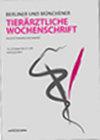Epidemiology of Echinococcus multilocularis infections: A review of the present knowledge and of the situation in Germany
IF 0.6
4区 农林科学
Q4 VETERINARY SCIENCES
Berliner und Munchener tierarztliche Wochenschrift
Pub Date : 2020-03-17
DOI:10.2376/0005-9366-2020-5
引用次数: 3
Abstract
Human alveolar echinococcosis (AE) and infections of foxes, raccoon dogs and dogs as the most important definitive hosts of Echinococcus (E.) multilocularis in Central Europe remain topics of general interest. Nonetheless, the incidence in humans in Germany is low (appr. 30 reported new cases per year, maximum 56 cases in 2018). Usually, the infection does not cause any clinical signs in definitive host, whereas it is often lethal in intermediate hosts, particularly in primates. Infections with E. multilocularis occur in all parts of Germany, in particular in the red fox ( Vulpes vulpes); a total of 5602 cases were officially reported in Germany between 2004 and 2019. The epidemiological situation in the definitive hosts can be characterised as endemic and stable. We here review the present knowledge on the life cycle and biology of E. multilocularis and the epidemiological situation in Germany.多房棘球绦虫感染的流行病学:对德国目前的知识和情况的回顾
人类肺泡棘球蚴病(AE)和感染的狐狸,浣熊狗和狗作为最重要的多房棘球蚴(e)在中欧的最终宿主仍然是普遍关注的话题。尽管如此,德国的人类发病率很低。每年报告30例新病例,2018年最多56例)。通常,这种感染在最终宿主中不会引起任何临床症状,而在中间宿主,特别是灵长类动物中,往往是致命的。德国各地都有多房肠杆菌感染,尤其是红狐(Vulpes Vulpes);2004年至2019年,德国共正式报告了5602例病例。最终宿主的流行病学情况可表现为地方性和稳定。本文综述了德国多房棘球绦虫的生命周期、生物学和流行病学现状。
本文章由计算机程序翻译,如有差异,请以英文原文为准。
求助全文
约1分钟内获得全文
求助全文
来源期刊
CiteScore
0.90
自引率
0.00%
发文量
0
审稿时长
18-36 weeks
期刊介绍:
The Berliner und Münchener Tierärztliche Wochenschrift is an open access, peer-reviewed journal that publishes contributions on all aspects of veterinary public health and its related subjects, such as epidemiology, bacteriology, virology, pathology, immunology, parasitology, and mycology. The journal publishes original research papers, review articles, case studies and short communications on farm animals, companion animals, equines, wild animals and laboratory animals. In addition, the editors regularly commission special issues on topics of major importance. The journal’s articles are published either in German or English and always include an abstract in the other language.

 求助内容:
求助内容: 应助结果提醒方式:
应助结果提醒方式:


